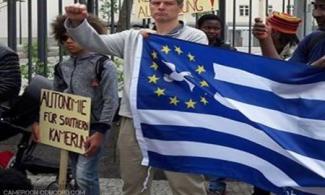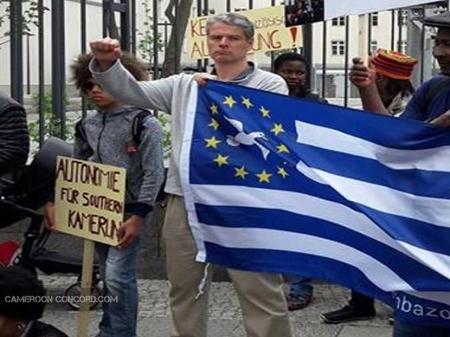
A leader of the Ambazonia Separatist Movement, who preferred not to be named, has accused the Federal Government of Nigeria of disobeying the order of the Federal High Court in Abuja, directing it to institute a case for the Southern Cameroon, before the International Court of Justice (ICJ).
According to the terms of the agreement entered by the Federal Government of Nigeria and some citizens of Southern Cameroon on behalf of the region, Nigeria’s government agreed to table before ICJ the issue of self-determination of the Anglophone region.
The agreement which was signed on March 5, 2002, stated that the “Federal Republic of Nigeria shall institute a case before the International Court of Justice concerning the following;
“Whether the union envisaged under the Southern Cameroon Plebiscite 1961 between La Republique Du Cameroun and Southern Cameroon legally took effect as contemplated by the relevant United Nations Resolutions, particularly United Nations General Assembly Resolution 1352 (XIV) of 16th October 1959 and United Nations Trusteeship Council Resolution 2013 (XXVIV) of 31st May 1960.

“Whether the termination by the government of the United Kingdom of its trusteeship over the southern Cameroon on 30th September 1961 without ensuring prior implementation of the Constitutional arrangement under which Southern Cameroon and La Republique Du Cameroon were to unite as one Federal State was not a breach of Articles 3 and 6 of the Trusteeship Agreement for the Territory of Cameroon under British Administration approved by the General Assembly of the United Nations 1th December 1946,
“Whether the people of Southern Cameroon are not entitled to self-determination within clearly defined territory from La Republique Du Cameroun
“Whether it is the Southern Cameroon and not Le Republique Du Cameroun that shares a maritime boundary with the Federal Republic of Nigeria”
The Separatist leader, reacting to the recent arrest of some Ambazonia leaders in Abuja also accused Nigeria’s government of being in complicity with Mr. Paul Biya, the President of Cameroon.
The Department of State Security (DSS) arrested ten separatist leaders from Southern Cameroon, on Friday, January 5, 2018.
The detained persons are executives of the interim government of Ambazonia- the name of a sovereign Southern Cameroon.
They were reportedly arrested at about 7:30 PM, from Nera Hotels, (Ekwueme Road), in Abuja Nigeria.
The separatist officials were meeting to galvanize support for Southern Cameroonian refugees in Nigeria but shortly after the meeting had started, officials of DSS barged into the hotel and whisked them away.
Mr. Wilfred Tassang, one of the men arrested by DSS operatives, was at the vanguard of early negotiations between the Southern Cameroon and the French government.
In an interview with SahaReporters in December of last year, he said the Biya government tried to assassinate him, at the peak of the dialogue with the trade union consortium.
“In the course of the strike action, the government created some ad-hoc committees to look into the grievances that had been tabled by the teachers union and the lawyers association. The work of the teachers’ union committee ended on January 13, 2018.
“Prior to that committee meeting, word leaked out to our communities that I had been targeted for elimination by the government. On the night of the 12th, bike riders in Bamenda- where I reside, came up to the governor’s office and escorted me home.
“The meeting on the 13th ended on a good note even though we had misgivings. The bike riders and some vehicles formed a convoy again to escort me home but they preceded me.
“Unknowing to them, an ambush had been laid on my path. And so the soldiers opened fire and killed three bike riders on the spot.”
Mr. John Mbah Akuroh- an exiled journalist and trade union leader, said internal sources within the Nigeria military rank say the leaders were picked up for carrying expired papers and not for political reasons.
He said; “The DSS was trying to find out if there is a link between the boys who were training and the interim government.”
However, the exiled journalist revealed that he was shocked by the claim of expired papers.
“There are three refugees among them that I know are registered and have Identity cards as refugees: Mr. Tassang Wilfred, Eyambe Elias and Dr. Nfor Ngala Nfor. The others are permanent Nigerian residents working in some universities: ABU Zaria, AUN Yola and a university in Canaan land. “So, I am surprised to hear of expired papers.”
The other five detained Southern Cameroon leaders are; Dr. Fidelis Nde Che, Dr. Henry Kimeng, Prof. Awasum, Dr. Cornelius Kwanga and the separatist government’s president- Sisiku Ayuk Tabe.
Since nationalist leaders and the interim government called for Southern Cameroon to pour out into the streets in a declaration of the independence of Ambazonia from French Cameroon on the first of October 2017, over 20,000 people have fled into Nigeria to escape an unrelenting brutal crackdown on protesters and sympathizers.
Most of the fleeing families have crossed the border into Cross River state. Pockets of refugees have also fled into Akwa Ibom, Benue and Taraba states. The Director of the State Emergency Management Agency in Cross River, Mr. John Inaku said the state is overwhelmed by the refugees and a resolution needs to be reached soon.
“I intend to tell the world that the problem there in Cameroon has not subsided. Right away we have over 22,000 migrants from Cameroon that are in Nigeria. In other to curb a situation where we don’t allow it spill over to the issues of Yemen and all of that, I feel that the communities involved should move in internationally and regionally and see how they can solve the problem.”
In December 2017, Nigeria’s Vice President, Mr. Yemi Osinbajo received envoys from the Cameroonian government led by the country’s Minister for Territorial Administration and Decentralization, Mr. Rene Sadithe.
The Nigerian government at the time said the objective of the meeting was to boost diplomatic ties between the two nations.
However, reports have it that the meeting had a second agenda. The Biya regime needed Nigeria’s security forces to arrest 15 wanted trade union leaders. The French dominated government also sought to get Nigeria’s partnership in curtailing the activities of exiled Southern Cameroonian activists.
On the 2nd of the same month, Mr. Akuroh obtained intelligence from the Cameroonian government, alleging that the Nigerian government had given Biya’s forces the pass to chase refugees right into Nigeria.
The exact details of that permit occurred three days later. On December 5, 2017, a combined force of gendarmes and soldiers chased fleeing Anglophone Cameroonians across the Ekang border in Akampa local government area of Cross River state.
On December 14th, 2017, Nigeria’s ambassador to Cameroon, Mr. Lawan Abba Gashagar met with President Biya.
He said Nigeria was not in support of the secessionists but advocated for a speedy return to peace.
Recall that the violence began in December of 2016, when the Cameroonian government responded to protests against the imposition of French in schools and courts, with detentions, beatings and killings.
Trade union leaders in the English speaking regions of Southern Cameroon had halted the Northwest and Southwest regions of the country with sit-at-home strikes to press home their demands.
The Biya regime proscribed the consortium and declared all its leaders wanted. Several were arrested and many were forced into exile.